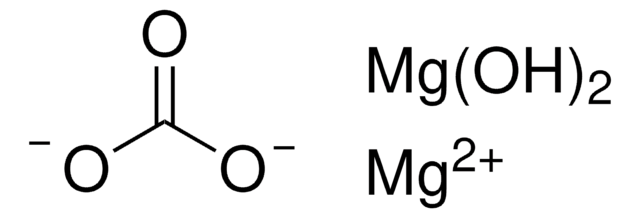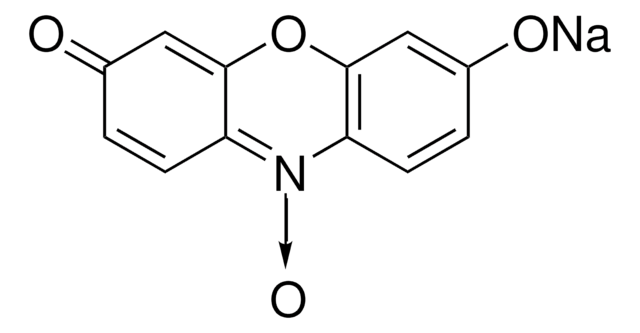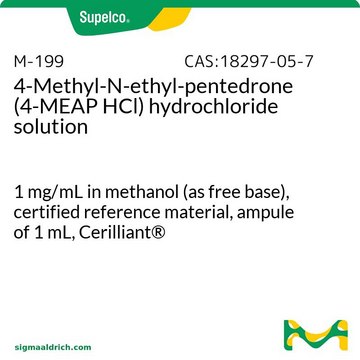M7179
Magnesium carbonate
meets USP testing specifications
Sinónimos:
Magnesium carbonate hydrate
Iniciar sesiónpara Ver la Fijación de precios por contrato y de la organización
About This Item
Fórmula lineal:
MgCO3 · x H2O
Número de CAS:
Peso molecular:
84.31 (anhydrous basis)
Número MDL:
Código UNSPSC:
51171508
ID de la sustancia en PubChem:
NACRES:
NA.21
Productos recomendados
Agency
USP/NF
meets USP testing specifications
Nivel de calidad
concentración
40.0-43.5% (Mg (as MgO))
aplicaciones
pharmaceutical (small molecule)
cadena SMILES
O.[Mg++].[O-]C([O-])=O
InChI
1S/CH2O3.Mg.H2O/c2-1(3)4;;/h(H2,2,3,4);;1H2/q;+2;/p-2
Clave InChI
OUHCLAKJJGMPSW-UHFFFAOYSA-L
¿Está buscando productos similares? Visita Guía de comparación de productos
Aplicación
- Growth, secondary metabolite production, and in vitro antiplasmodial activity of Sonchus arvensis L. callus under dolomite [CaMg(CO3)2] treatment.: This research investigates the effect of dolomite, containing magnesium carbonate, on the growth and biochemical profile of Sonchus arvensis L. callus cultures, highlighting its potential for enhancing bioactive compound production (Wahyuni et al., 2021).
Código de clase de almacenamiento
11 - Combustible Solids
Clase de riesgo para el agua (WGK)
WGK 3
Punto de inflamabilidad (°F)
Not applicable
Punto de inflamabilidad (°C)
Not applicable
Equipo de protección personal
Eyeshields, Gloves, type N95 (US)
Elija entre una de las versiones más recientes:
¿Ya tiene este producto?
Encuentre la documentación para los productos que ha comprado recientemente en la Biblioteca de documentos.
Los clientes también vieron
Elijah J Petersen et al.
Environmental health perspectives, 116(4), 496-500 (2008-04-17)
Carbon nanotubes represent a class of nanomaterials having broad application potentials and documented cellular uptake and ecotoxicological effects that raise the possibility that they may bioaccumulate in living organisms. Radioactively labeled nanotubes were synthesized using a novel methane chemical vapor
Nadine Kaesler et al.
Nephrology, dialysis, transplantation : official publication of the European Dialysis and Transplant Association - European Renal Association, 35(1), 65-73 (2019-02-05)
Optimal phosphate control is an unmet need in chronic kidney disease (CKD). High serum phosphate increases calcification burden and is associated with mortality and cardiovascular disease in CKD. Nicotinamide (NA) alone or in combination with calcium-free phosphate binders might be
Johanna Mosig et al.
Journal of pharmaceutical sciences, 104(3), 1108-1118 (2015-01-07)
The influence of lubrication and particle size on the reduced compactability after dry granulation was investigated. Powder cellulose, lactose, magnesium carbonate, and two types of microcrystalline cellulose were roll compacted, granulated, and sieved into particle fractions. Particle fractions were compressed
Ronak B Shah et al.
Journal of controlled release : official journal of the Controlled Release Society, 196, 60-70 (2014-09-16)
A biomimetic approach to organic solvent-free microencapsulation of proteins based on the self-healing capacity of poly (DL)-lactic-co-glycolic acid (PLGA) microspheres containing glycosaminoglycan-like biopolymers (BPs), was examined. To screen BPs, aqueous solutions of BP [high molecular weight dextran sulfate (HDS), low
Benjamin T Manard et al.
Applied spectroscopy, 69(1), 58-66 (2014-12-17)
Liquid sampling-atmospheric pressure glow discharge (LS-APGD) microplasma is being developed as a secondary vaporization-excitation source for the optical emission analysis of laser ablation (LA)-generated particle populations. The practicalities of this coupling are evaluated by determining the influence of source parameters
Nuestro equipo de científicos tiene experiencia en todas las áreas de investigación: Ciencias de la vida, Ciencia de los materiales, Síntesis química, Cromatografía, Analítica y muchas otras.
Póngase en contacto con el Servicio técnico






